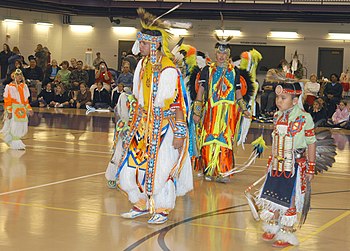Ho-Chunk
|
Members of the Winnebago Tribe's dance team at the Lied Activity Center in Bellevue, Nebraska, 2006
|
|
| Total population | |
|---|---|
| (7000 (1990)) | |
| Regions with significant populations | |
| United States (Wisconsin, Nebraska and Iowa) | |
| Languages | |
| English, Hocąk | |
| Religion | |
| Medicine Lodge, Native American Church, Agnostics, Atheists and Christianity | |
| Related ethnic groups | |
| Iowa, Omaha, Otoe, Missouri, Arikara, Absaroke, Ponca, Osage, Kansa, Quapaw |
The Hoocąągra, sometimes called "Ho-Chunk" or Wisconsin Winnebago, are a Siouan Native American group native to the present-day states of Wisconsin, Minnesota, and parts of Iowa and Illinois. They are in the process of redefining all the lands that were taken from them with a traditional territory map.
There are two separate federally recognized tribal governments, the Ho-Chunk Nation of Wisconsin and the Winnebago Tribe of Nebraska. According to Gordon Thunder (Wakanja), the Hoocąągra have been systematically removed from their homelands, with other tribes now occupying many of those places. The Ho-Chunk Nation of Wisconsin, which at one time consisted primarily of tribal members spread over 13 counties of Wisconsin, have a traditional territorial claim in an area encompassed by a line from Green Bay to Minneapolis to St. Louis to Chicago. Some in the federal and state governments have undermined the Hoocąągra land claims, however, repatriation activities document where many villages once stood. The Hoocąągra Waaziijahaaci were never assigned a reservation and now have tribal or nation members who live in 43 of the 50 states in America. They also have tribal members in Canada, Mexico, Hawaii, the Middle East, Germany.
The Winnebago Tribe of Nebraska live on a federal reservation in Nebraska. While related, the two tribes are distinct federally recognized sovereign nations and peoples, each having its own constitutionally formed government, and completely separate governing and business interests.
Since the late 20th century, both tribal councils have authorized the development of casinos to generate revenue to support economic development, infrastructure, health care and education. The Ho-Chunk Nation is working on language restoration and has developed a Hoocąąk-language app for the iPhone. Since 1988, it has pursued a claim to the Badger Army Ammunition Plant as traditional territory; the area has since been declared surplus, but the Ho-Chunk have struggled with changes in policy at the Department of the Interior. The department supported the Ho-Chunk claim in 1998, but in 2011 refused to accept the property on their behalf.
...
Wikipedia

